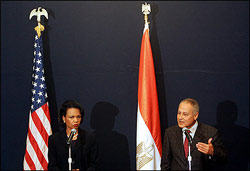
US Secretary of State Condoleezza Rice(L)
and Egyptian Foreign Minister Ahmad Abul Gheit give a joint press conference in
Cairo. Xinhua/AFP
US Secretary of State Condoleezza Rice on Tuesday urged the Palestinian
militant group Hamas to renounce violence after it swept to power in the Jan. 25
Palestinian parliamentary elections.
"You cannot have one foot in the camp of terror and another foot in the camp
of politics," Rice told a joint press conference with Egyptian Foreign Minister
Ahmed Abul Gheit.
The top U.S. diplomat reiterated demand that Hamas renounce violence,
recognize Israel and accept existing agreements before taking power in the
Palestinian territories.
"The international community expects that any Palestinian government will
have to meet certain requirements for governing, which means a dedication to
peace, a dedication to the agreements that the Palestinians have signed on
before," Rice said.
"Obviously, you can't have peace if you don't recognize the other partner and
therefore the recognition of Israel's right to exist and the need to renounce
terror," she added.
Palestinian President Mahmoud Abbas on Tuesday officially appointed senior
Hamas leader Ismail Haneya as prime minister and asked him to form a new
Palestinian government.
Hamas, branded by Israel and Washington as terrorist organization, has
rejected negotiation with Israel and the Western threat to cut off aid to the
future Palestinian government if it failed to meet certain conditions.
Rice, who arrived in the Egyptian capital Cairo on Tuesday, the first leg of
her five-day regional tour aimed at rallying support of Washington's Arab allies
for its policy on Hamas and Iran.
Rice is scheduled to meet Egyptian President Hosni Mubarak on Wednesday
before heading to Saudi Arabia and the United Arab Emirates.
Rice is expected to urge the Arab allies to press Hamas to moderate its
stance as Hamas leaders are wooing the Arab and Islamic world to make up the
shortfall of money in case there is a cutoff in Western assistance.
Egypt, which agrees with Washington on the need for Hamas to drop its
commitment to the destruction of Israel, has so far stopped short of exerting
substantial pressure, apparently fearing a backlash at home where anti-U.S.
sentiments are always running high.
An Arab analyst believed that Rice would also use the trip to the Gulf region
to press for isolating Iran, which it accuses of seeking nuclear weapons under
the cover of a civilian nuclear program.
Iran has denied the U.S. charge, saying that its nuclear program is solely
for peaceful purposes.
"Washington needs the support of the Gulf nations, which are neighbors to
Iran, for its campaign to isolate Teheran over its alleged nuclear ambitions,"
said Saber Rabie, a former professor of political science at Cairo
University.



